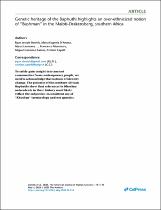| dc.contributor.author | Daniels, Ryan Joseph | |
| dc.contributor.author | D'Amato, Maria Eugenia | |
| dc.contributor.author | Lesaoana, Mpasi | |
| dc.date.accessioned | 2023-05-02T12:31:20Z | |
| dc.date.available | 2023-05-02T12:31:20Z | |
| dc.date.issued | 2023 | |
| dc.identifier.citation | Daniels, R. J. et al. (2023). Genetic heritage of the Baphuthi highlights an over-ethnicized notion of “Bushman” in the Maloti-Drakensberg, southern Africa. American Journal of Human Genetics, 110(5), 880-894. https://doi.org/10.1016/j.ajhg.2023.03.018 | en_US |
| dc.identifier.issn | 1537-6605 | |
| dc.identifier.uri | https://doi.org/10.1016/j.ajhg.2023.03.018 | |
| dc.identifier.uri | http://hdl.handle.net/10566/8881 | |
| dc.description.abstract | Using contemporary people as proxies for ancient communities is a contentious but necessary practice in anthropology. In southern Africa, the distinction between the Cape KhoeSan and eastern KhoeSan remains unclear, as ethnicity labels have been changed through time and most communities were decimated if not extirpated. The eastern KhoeSan may have had genetic distinctions from neighboring communities who speak Bantu languages and KhoeSan further away; alternatively, the identity may not have been tied to any notion of biology, instead denoting communities with a nomadic “lifeway” distinct from African agro-pastoralism. The Baphuthi of the 1800s in the Maloti-Drakensberg, southern Africa had a substantial KhoeSan constituency and a lifeway of nomadism, cattle raiding, and horticulture. | en_US |
| dc.language.iso | en | en_US |
| dc.publisher | Cell Press | en_US |
| dc.subject | Identity | en_US |
| dc.subject | Ethnicity | en_US |
| dc.subject | Race | en_US |
| dc.subject | Culture | en_US |
| dc.subject | Migration | en_US |
| dc.subject | KhoeSan | en_US |
| dc.title | Genetic heritage of the Baphuthi highlights an over-ethnicized notion of “Bushman” in the Maloti-Drakensberg, southern Africa | en_US |
| dc.type | Article | en_US |

